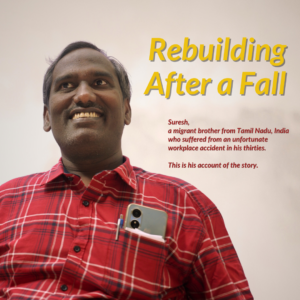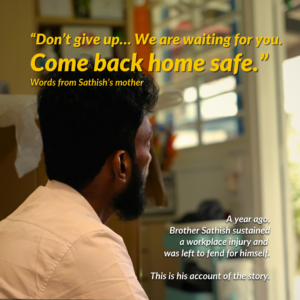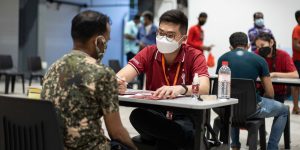
Li Zheng Yuan
“Thank you for hosting us,” Paul says, his eyes sparkling expectantly. It was a sentence taught to him by a teacher from the United World College, during a joint outreach program between the school and HealthServe. He says that to everyone now, at every opportunity he gets. Paul, or Li Zheng Yuan, is the first and only PRC migrant worker I know here who has adopted an English name. Amiable and chatty, Paul takes immense pride in his pursuit of learning the English language while he patiently waits for his work injury compensation case to be resolved. He has been stuck in this limbo for over 7 months now. In these long and turbulent months, Paul has been pinballed around many different agencies, tirelessly navigating the complex foreign labour legal system in Singapore in an attempt to get the injury compensation and owed salary he rightfully deserves.

“I have come to terms with the fact that I may not get the full amount (that he is legally entitled to). But seeing all the things that HealthServe has done for me, and all the little kinds acts that strangers on the street have offered, I cannot ask for more.”
Although he is in the process of learning English, our conversations are primarily in Mandarin, a language we both share. Today, Paul is a veneer of optimism. He talks to us endlessly about his many stories of kind strangers he meets on the street, and everything else under the sun. These tales are often supplemented by photos he took, ranging from the fireworks on New Year’s Eve to a hotpot dinner with his friends. He is a social butterfly. Occasionally, when the conversation leads back to the worksite accident that crushed his fingers, he grows wistful. His injury, likely to be a permanent one, has put him out of work, rendering him unable to draw an income for his family back home. The medical leave wages he claims under the Work Injury Compensation Act (WICA) may be sufficient for now, but in the long term, his injury is likely to impede him in employment. Yet, with what little he has, he gives back to the people who have helped him.
“Don’t spend your money on all these things!” – something we often hear in our Geylang Centre. Once, it was pots of red flowers adorning the corridor. Another time, an entire decorated Christmas tree for the office. With what little Paul can afford to splurge, it is never for himself. We tell him to save the money for himself, not to spend it on unnecessary things for us at the office. But a part of me understands where he is coming from. When someone throws us a lifeline while we are drowning, we would want to show our gratitude in whatever way we can.
Karuna
Amidst the hubbub of the kitchen during our Desker Centre Christmas party, an Indian national, quietly hard at work, helps to dish out and serve the meal portions to his fellow compatriots. At first glance, one might think that he is a staff of the restaurant. However, Karuna had voluntarily taken up the role, eager to give back to the organization that had helped him at his lowest point in life. On June 2017, Karuna’s life took a downward spiral when a panel from the water tank he was constructing fell on his leg, fracturing it. Ever since then, it has been a whirlwind of hospital trips, disputes with his employer, and a short bout of homelessness before he came to HealthServe. Now residing in our Desker shelter, Karuna mills around the Centre in the day, helping out with daily chores and cooking for the Desker food project every week, while he waits for his case to be resolved.

Often at the office, Karuna is all smiles and loves chatting with the caseworkers. Sometimes the conversation revolves around his case and worries, sometimes it’s about the mundane. He has an easy-going air to him, maintaining his affability despite the pressure that he faces.
“你是来之哪一个国家?(which country are you from?)”Karuna enquires, to every Chinese migrant worker or HealthServe staff as he goes about during the day. This, along with “你有几个孩子?(how many kids do you have?)” and “我来之印度 (I am from India)”are some of his favourite phrases, as he diligently learns the Chinese language. Why? One might ask. It is for the simple reason of bringing joy to people. When he speaks in Mandarin to the people around him, it never fails to bring a smile to their faces. And that is what keeps him going.
Joel, a fellow intern of mine, once shared a story of when he accompanied Karuna to an appointment at the Ministry of Manpower. Waiting outside the consultation rooms, quiet introspection had replaced Karuna’s usual cheerful outlook. Perhaps past bad experiences here had aroused feelings of anxiety and desolation. But as he encountered another Chinese migrant worker at the waiting room, he struck up a conversation with him. A few simple exchanges in Mandarin later, the Chinese migrant worker left. But Karuna’s mood had lifted considerably. A simple connection can be powerful. Just a little human touch.
An Unlikely Friendship
A PRC migrant worker with a passion for learning English. An Indian construction worker looking to add the Chinese language to his repertoire. It only seemed to be a matter of time before their paths would cross. It did.
At the Geylang food program, Paul and I were settling the registrations. He receives a video call. It is Karuna. He rejects the call, wary of the mobile data charges that will be incurred.
“Later”, he tells me. “Back when there’s WiFi”
He tells me about their rather unique and unusual friendship. They met during one of the free Traditional Chinese Medicine (TCM) sessions run by volunteer practitioners at our Geylang Centre. Karuna, eager to practice his Mandarin, exchanged some simple lines of conversation with Paul. They would later continue bumping into each other occasionally, either at the church they both attend, or at the weekly TCM sessions. Each encounter would be one with beaming smiles and excited ‘hellos’ from both parties, a picture of a pure and simple friendship. They would then eagerly practice what they have learnt in English and Mandarin, respectively, on each other, and their pride at each other’s progress is always palpable.
“I love your wife,” Paul cheekily says to Karuna over the phone. This inside joke shared by the two buddies stems from a failed attempt to teach each other how to say “I love you, my wife” to their own spouses over the phone.
And thus, Paul and Karuna’s story is one that redefines friendship for me – how two migrant workers; an Indian national and a PRC, are able to become such good friends in spite of their differences. Friendship doesn’t have to be about long conversations over coffee, or exchanging deep meaningful insights with each other. Simple shared experiences (being a fish out of water in a strange land) and common goals (providing for family, piety, life in limbo) are enough to bring us together. People don’t have to be similar to be friends. Bonds forged from our incongruities are often the strongest, and best.
Story and photos by XiZhe Sim





